By Lukas Szrot · Monday, February 22, 2016 The following paper was presented at the 2016 Telos Conference, held on January 16–17, 2016, in New York City. For additional details about this and upcoming conferences, please visit the Telos-Paul Piccone Institute website.
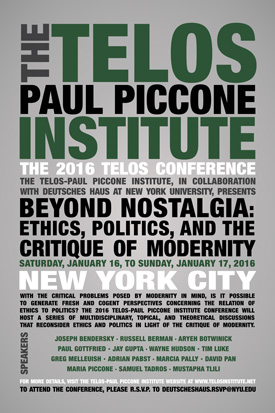 What is modernity? First, a period “occasioned by a peculiarly ahistorical view of the world, which is flattened into an eternal present. The world we experience appears to exhaust all possible worlds.” Second, modernity is deeply rooted in the three Kantian principles of Enlightenment: “‘What can know?’ the question of knowledge; of the ‘What should I do?’ which is the question of ethics, and of the ‘What can I hope?'” What is modernity? First, a period “occasioned by a peculiarly ahistorical view of the world, which is flattened into an eternal present. The world we experience appears to exhaust all possible worlds.” Second, modernity is deeply rooted in the three Kantian principles of Enlightenment: “‘What can know?’ the question of knowledge; of the ‘What should I do?’ which is the question of ethics, and of the ‘What can I hope?'”
The Western modern project is dependent upon both Greek and Hebrew antiquity. In ancient Ionia, Thales of Miletus predicted a solar eclipse, Anaximander predicted the changing of the seasons, Theodorus invented the ruler, the carpenter’s square, and the level, and Hippocrates began accumulating medical knowledge through trial and error. These “pre-Socratic” Ionians were merchants and artisans; they worked with their hands, whereas the Athenians were engaged primarily in contemplation.
Continue reading →
By Kenneth Rasmussen · Thursday, March 12, 2015 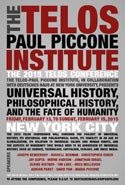 Already in the first third of the 20th century, Karl Jaspers began formulating a philosophy that addressed the collapse of Enlightenment concepts of universal history and offered a perspective that could help us reformulate “universal history” as a viable concept. Jaspers’ work in this area is, I believe, underappreciated, and constitutes a realistic “cosmopolitan vision” that could help us address many of the thorny issues of global cultural conflict and diversity that we face today. Already in the first third of the 20th century, Karl Jaspers began formulating a philosophy that addressed the collapse of Enlightenment concepts of universal history and offered a perspective that could help us reformulate “universal history” as a viable concept. Jaspers’ work in this area is, I believe, underappreciated, and constitutes a realistic “cosmopolitan vision” that could help us address many of the thorny issues of global cultural conflict and diversity that we face today.
Continue reading →
By Mary Frances McKenna · Thursday, October 30, 2014 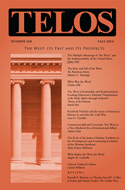 In this article, I focus on the impact on modern Western thinking, ideas, and engagement with the world of the loss of the assumption of a creator, or an intelligent ordering agent, in conjunction with the emphasis on detail in preference to the whole in modern thought. I begin by discussing some of the critical dynamics contributed by Jerusalem, Athens, and Rome to the concept of Europe in an attempt to identify the source of the energy and vitality arising from this synthesis. I particularly look at the synthesis of Jerusalem and Athens, specifically how each influenced the other and where the potential for synergy arose. This Western synthesis no longer operates in Europe and the West. In this article, I focus on the impact on modern Western thinking, ideas, and engagement with the world of the loss of the assumption of a creator, or an intelligent ordering agent, in conjunction with the emphasis on detail in preference to the whole in modern thought. I begin by discussing some of the critical dynamics contributed by Jerusalem, Athens, and Rome to the concept of Europe in an attempt to identify the source of the energy and vitality arising from this synthesis. I particularly look at the synthesis of Jerusalem and Athens, specifically how each influenced the other and where the potential for synergy arose. This Western synthesis no longer operates in Europe and the West.
Continue reading →
By Greg Melleuish and Susanna Rizzo · Friday, September 13, 2013 Greg Melleuish and Susanna Rizzo’s “From Secular Temporality to Post-Secular Timelessness: Trekking the Past’s Future and Future’s Past” appears in Telos 163 (Summer 2013). Read the full version online at the Telos Online website, or purchase a print copy of the issue in our store.
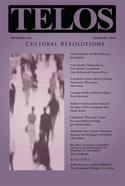 This essay is built on the assumption that History is as much about the future as it is about the past and that there is a “politics of history” that determines the relationship of the past to the present and the future. The secularization thesis created a model of history in which human beings passed from a condition in which they were religious, primitive, and querulous to one in which they were moving toward a world that would be not only secular but also peaceful. At the same time, the end of History can be understood in eschatological terms in which we are always at the end of days waiting for the purging that will allow the purpose of History to be fulfilled. The return of religion destroys this narrative and allows others to return, including History as irony and the possibility of the story as a denial of History. Post-secular History reflects both the crumbling of this once certain narrative and the legitimacy of the modern state that was built on that narrative. It is a crisis of authority, as can be seen in the proliferation of views and ideas that can be found on the world wide web, and the seeming erosion of the capacity of historians to control History and structure its narratives. This essay is built on the assumption that History is as much about the future as it is about the past and that there is a “politics of history” that determines the relationship of the past to the present and the future. The secularization thesis created a model of history in which human beings passed from a condition in which they were religious, primitive, and querulous to one in which they were moving toward a world that would be not only secular but also peaceful. At the same time, the end of History can be understood in eschatological terms in which we are always at the end of days waiting for the purging that will allow the purpose of History to be fulfilled. The return of religion destroys this narrative and allows others to return, including History as irony and the possibility of the story as a denial of History. Post-secular History reflects both the crumbling of this once certain narrative and the legitimacy of the modern state that was built on that narrative. It is a crisis of authority, as can be seen in the proliferation of views and ideas that can be found on the world wide web, and the seeming erosion of the capacity of historians to control History and structure its narratives.
Continue reading →
By Adrian Pabst · Wednesday, May 29, 2013 Adrian Pabst’s “Athens, Jerusalem, and Rome: A Reply to Luciano Pellicani” appears in Telos 162 (Spring 2013). Read the full version online at the Telos Online website, or purchase a print copy of the issue in our store.
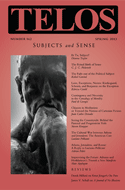 According to Luciano Pellicani, the U.S. culture wars are grounded in a perpetual struggle between the enlightening forces of reason and democracy, on the one hand, and the dark forces of faith and theocracy, on the other hand. Accordingly, he claims that the Puritans sought to establish a medieval collectivist theocracy, not a modern market democracy, and that the U.S. “culture war” between enlightened secular liberalism and reactionary religious conservatism ultimately rests on the perpetual battle between Athenian reason and the faith of Jerusalem. According to Luciano Pellicani, the U.S. culture wars are grounded in a perpetual struggle between the enlightening forces of reason and democracy, on the one hand, and the dark forces of faith and theocracy, on the other hand. Accordingly, he claims that the Puritans sought to establish a medieval collectivist theocracy, not a modern market democracy, and that the U.S. “culture war” between enlightened secular liberalism and reactionary religious conservatism ultimately rests on the perpetual battle between Athenian reason and the faith of Jerusalem.
Continue reading →
By Luciano Pellicani · Thursday, April 4, 2013 Luciano Pellicani ‘s “The Cultural War between Athens and Jerusalem: The American Case” appears in Telos 162 (Spring 2013). Read the full version online at the Telos Online website, or purchase a print copy of the issue in our store.
 Despite what Harold Berman claimed, the writers of the American Constitution were not inspired by strong religious convictions. On the contrary, as typical men of the Enlightenment they were severe critics of Christianity, considering it an obscurantist and intolerant tradition in all its versions. Hence their cultural battle to achieve the institutionalization of what Thomas Jefferson called “the wall of separation between State and Church” that would guarantee the greatest religious freedom. A freedom that was periodically threatened by fundamentalist movements which, in the name of Jerusalem, sought—and still seek—to establish a confessional state governed by the truth revealed in the Bible whereas the founding fathers hoped that “what Athens was in miniature, America will be in magnitude.” It is not true that America was born modern and progressive, as Ernest Gellner has maintained. It became so through the cultural war between Athens and Jerusalem that began in the eighteenth century and is still in progress. Despite what Harold Berman claimed, the writers of the American Constitution were not inspired by strong religious convictions. On the contrary, as typical men of the Enlightenment they were severe critics of Christianity, considering it an obscurantist and intolerant tradition in all its versions. Hence their cultural battle to achieve the institutionalization of what Thomas Jefferson called “the wall of separation between State and Church” that would guarantee the greatest religious freedom. A freedom that was periodically threatened by fundamentalist movements which, in the name of Jerusalem, sought—and still seek—to establish a confessional state governed by the truth revealed in the Bible whereas the founding fathers hoped that “what Athens was in miniature, America will be in magnitude.” It is not true that America was born modern and progressive, as Ernest Gellner has maintained. It became so through the cultural war between Athens and Jerusalem that began in the eighteenth century and is still in progress.
Continue reading →
|
|
 What is modernity? First, a period “occasioned by a peculiarly ahistorical view of the world, which is flattened into an eternal present. The world we experience appears to exhaust all possible worlds.” Second, modernity is deeply rooted in the three Kantian principles of Enlightenment: “‘What can know?’ the question of knowledge; of the ‘What should I do?’ which is the question of ethics, and of the ‘What can I hope?'”
What is modernity? First, a period “occasioned by a peculiarly ahistorical view of the world, which is flattened into an eternal present. The world we experience appears to exhaust all possible worlds.” Second, modernity is deeply rooted in the three Kantian principles of Enlightenment: “‘What can know?’ the question of knowledge; of the ‘What should I do?’ which is the question of ethics, and of the ‘What can I hope?'”  Already in the first third of the 20th century, Karl Jaspers began formulating a philosophy that addressed the collapse of Enlightenment concepts of universal history and offered a perspective that could help us reformulate “universal history” as a viable concept. Jaspers’ work in this area is, I believe, underappreciated, and constitutes a realistic “cosmopolitan vision” that could help us address many of the thorny issues of global cultural conflict and diversity that we face today.
Already in the first third of the 20th century, Karl Jaspers began formulating a philosophy that addressed the collapse of Enlightenment concepts of universal history and offered a perspective that could help us reformulate “universal history” as a viable concept. Jaspers’ work in this area is, I believe, underappreciated, and constitutes a realistic “cosmopolitan vision” that could help us address many of the thorny issues of global cultural conflict and diversity that we face today.  In this article, I focus on the impact on modern Western thinking, ideas, and engagement with the world of the loss of the assumption of a creator, or an intelligent ordering agent, in conjunction with the emphasis on detail in preference to the whole in modern thought. I begin by discussing some of the critical dynamics contributed by Jerusalem, Athens, and Rome to the concept of Europe in an attempt to identify the source of the energy and vitality arising from this synthesis. I particularly look at the synthesis of Jerusalem and Athens, specifically how each influenced the other and where the potential for synergy arose. This Western synthesis no longer operates in Europe and the West.
In this article, I focus on the impact on modern Western thinking, ideas, and engagement with the world of the loss of the assumption of a creator, or an intelligent ordering agent, in conjunction with the emphasis on detail in preference to the whole in modern thought. I begin by discussing some of the critical dynamics contributed by Jerusalem, Athens, and Rome to the concept of Europe in an attempt to identify the source of the energy and vitality arising from this synthesis. I particularly look at the synthesis of Jerusalem and Athens, specifically how each influenced the other and where the potential for synergy arose. This Western synthesis no longer operates in Europe and the West.  This essay is built on the assumption that History is as much about the future as it is about the past and that there is a “politics of history” that determines the relationship of the past to the present and the future. The secularization thesis created a model of history in which human beings passed from a condition in which they were religious, primitive, and querulous to one in which they were moving toward a world that would be not only secular but also peaceful. At the same time, the end of History can be understood in eschatological terms in which we are always at the end of days waiting for the purging that will allow the purpose of History to be fulfilled. The return of religion destroys this narrative and allows others to return, including History as irony and the possibility of the story as a denial of History. Post-secular History reflects both the crumbling of this once certain narrative and the legitimacy of the modern state that was built on that narrative. It is a crisis of authority, as can be seen in the proliferation of views and ideas that can be found on the world wide web, and the seeming erosion of the capacity of historians to control History and structure its narratives.
This essay is built on the assumption that History is as much about the future as it is about the past and that there is a “politics of history” that determines the relationship of the past to the present and the future. The secularization thesis created a model of history in which human beings passed from a condition in which they were religious, primitive, and querulous to one in which they were moving toward a world that would be not only secular but also peaceful. At the same time, the end of History can be understood in eschatological terms in which we are always at the end of days waiting for the purging that will allow the purpose of History to be fulfilled. The return of religion destroys this narrative and allows others to return, including History as irony and the possibility of the story as a denial of History. Post-secular History reflects both the crumbling of this once certain narrative and the legitimacy of the modern state that was built on that narrative. It is a crisis of authority, as can be seen in the proliferation of views and ideas that can be found on the world wide web, and the seeming erosion of the capacity of historians to control History and structure its narratives.  According to
According to 

